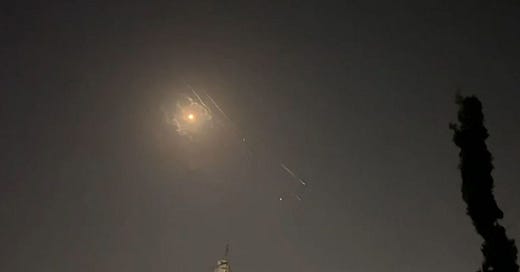Explosions light up the Jerusalem sky during Iran’s missile and drone attack on Israel (Photo by -/AFPTV/AFP via Getty Images)
This article first appeared in this week’s New Statesman magazine, we are sending to subscribers with their permission.
One of the most innovative strategic thinkers of the post-1945 era had no military experience and first made his name as a trade economist. Yet as classical military theory struggled to come to terms with the implications of nuclear weapons, Thomas Schelling found innovative and stimulating ways to talk about their transformational impact. He won the Nobel Prize for economics in 2005 for his contributions to game theory and how it might be applied to nuclear deterrence and arms control. His most important insights began with the observation that the shared fear of the ultimate catastrophe meant that within a potentially deadly US-Soviet conflict there could still be elements of cooperation. Superpower crises should be managed so that both sides felt that they had protected their most vital interests while avoiding all-out nuclear war. At the time, and since, the 1962 Cuban Missile Crisis was considered exemplary in showing how this might be achieved.
Schelling, who was behind such ideas as the hotline between Moscow and Washington, saw the advantages in direct communication to keep a dangerous situation under control. But he was also interested in more indirect forms of communication. He was particularly intrigued in how armed force could be used as a form of bargaining to convey to the other side not only a determination to protect interests but also how both sides could benefit from restraint. He sought to move consideration of the uses of violence away from simple assertions of brute strength to impose one’s will towards understanding them as competitions in risk-taking. The way that force was used went beyond any immediate military impact because it could also suggest the possibility of compromise, as well as a readiness to take further action if the compromises could not be found.
Keep reading with a 7-day free trial
Subscribe to Comment is Freed to keep reading this post and get 7 days of free access to the full post archives.




